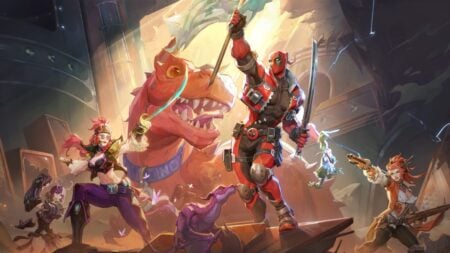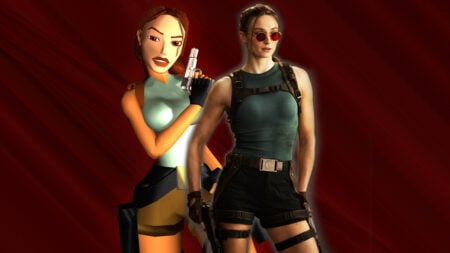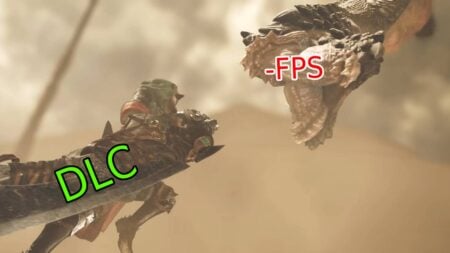Ah, yet another roguelike hitting Steam Early Access. Like games in the “Open-world Crafting Survival” genre, it is typically something I move past without so much as a second glance. I already have six of the exact same game sitting in my library with about one hour of playtime each.
But the art style of Darkest Dungeon, from Red Hook Studios, drew me in. The over the top bleakness and heavy shadowing is reminiscent of the “Tales from the Crypt” comics. Even the animation looks like a comic book come to life, as battles typically play out with quick background movement and flourishes of color rather than intricate character animations. However, beautiful and interesting art is not reason enough for me to pick up an Early Access roguelike. We’ve been down that road before.
The premise of the game is what stuck in my brain and made me go back to click the “Purchase” button. And I was certainly glad I did.

The plot of Darkest Dungeon is an interesting one. You play the role of the lord of a run-down estate. You are recruiting adventurers to explore some of the most dangerous dungeons surrounding this estate in order to restore your reputation and fame. However, these heroes are not the stalwart, god-crushing heroes typical to RPGs. These are seriously flawed, frightened, and psychologically fragile adventurers, and with that idea lies the central hook of Darkest Dungeon. In addition to managing the physical health of your heroes, you also have to manage their stress levels and psychological imperfections. You have to carefully analyze your team before you send them out onto an adventure together. Failure to do so will result in wasted money and dead adventurers.
Essentially, your party moves through the dungeon corridors, disarming traps, looting, and fighting monsters. Battles in the dungeon play out in a turn based RPG style, where your adventurers and the fiends they encounter will trade blows, buffs, and debuffs until one side emerges victorious. Each adventurer comes from one of ten classes. They are a little more unique than your traditional RPG fair. Instead of a fighter, you get a mighty leper or a pious crusader. Instead of rogues, you get highwaymen and jesters. Rather than play as a healer, you have an occultist at the back of your party who can heal a huge amount of damage, but his odd experiments sometimes can also cause your party members to bleed out.

Each of these heroes also has a randomly selected variety of what the game calls “quirks.” These psychological attributes can be positive or negative; they give different stat bonuses or make certain random events play out in a different manner. Balancing these quirks is a huge part of a very tense risk-reward system that plays out with nearly every decision you make in the game. I may have a bounty hunter who exhibits the “precision striker” and “quick reflexes” quirks, which gives him a bonus to speed and critical hit percentage. However, he also has the “fear of the unholy” quirk. Do I risk sending him into the warrens, where the undead abound? If his stress gets too high while he is down there, he will become completely ineffective and becomes a liability to the entire team, who may all get killed because of my poor decisions. These choices are everywhere in Darkest Dungeon, and they keep every facet of the game intriguing and fun.
This game has been compared quite a bit to XCOM due to the squad management aspect. I feel a more accurate comparison is the Football Manager series. Obviously the “spreadsheet with graphics attached” is not in Darkest Dungeon, but the games do have a similar unforgiving aspect if you do not do your research. You can throw together a random squad of adventurers and send them out to cleanse the ruins, but don’t be surprised if three rooms in they are fighting amongst each other, bleeding and limping just to try to get out alive. Have an adventurer who is constantly not pulling her weight due to a poor collection of quirks? Send her packing and bring in a new person to train up in her place. The idea of eliminating a weak link in your adventuring group and bringing in fresh blood brings to mind a free-agency market in any sports game. You have to constantly be scouting for what roles you need to fill on your team or else you will be a sitting duck when you hit the dungeons.

That being said, sometimes all the planning in the world will not save you. As this is a roguelike, the randomness can sometimes come in and wreck even your best laid plans. Tiny variations can be the difference from a clean get away to a complete team wipe. Oh, did you leave the necromancer with one hit point left? Too bad, now your entire team is insane, cursed, and bleeding all over the floor. At times, the difficulty of the game can be almost oppressing; waves and waves of enemies, traps, and diseases will have you questioning if any combination of tactics could have defeated the randomly-generated dungeon you are currently questing through. However, for most, therein lies the fun of so many games of this ilk. It allows you to build a unique play style and feel great about it when everything goes according to plan. And, even though Darkest Dungeon can have a brutal difficulty, you rarely reach the “you are dead and must start the game over” point. If you have a bad run and get wiped, you always have your reserves and some shiny new rookie adventurers ready to go out there and kill some beasts.

The game is in Early Access, and that will give people some pause. However, Valve’s new rules for Steam’s Early Access program will hopefully reduce, if not eliminate, the issues that have caused some to mistrust the program. Second, this game has some serious polish already. It is missing some features, and they are obviously still in the process of tweaking and updating. Darkest Dungeon does seem like a game that has a strong community already and a transparent developer that takes that community to heart. I would highly recommend keeping your eye on this one, and, if difficulty and occasional random team wipes do not bother you, I would recommend purchasing it as is and being a part of the development cycle. After all, not too many games include a nymphomaniac, thanatophobic Jester wildly playing his lute to buff his teammates. It’s the little things.







